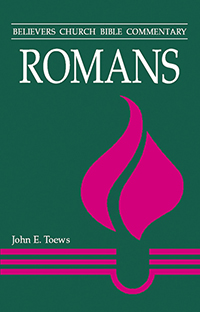Grace in Romans
![]() Home A B C D E F G H I J K L M N O P Q R S T U V W X Y Z Abbreviations Glossary
Home A B C D E F G H I J K L M N O P Q R S T U V W X Y Z Abbreviations Glossary
Grace (charis) is an important theological term in Protestant Christianity. It is associated with two understandings: 1) salvation as free gift, in contrast to any human effort to earn it; and 2) grace in oppo- sition to law, with law as the symbol for “works-salvation.”
Grace is an important word in the NT (155 uses), and especially in the Pauline letters (100 of the 155 uses). Romans uses grace the most in the Pauline letters (24 times); 2 Corinthians is next (18 times). The related word “free gift” (charisma) is with one exception a Pauline term (17 times in the NT; six in Rom.; seven in 1 Cor.; 1 Pet. 4:10 is the one non-Pauline use).
The root word for grace, char, means well being (compare shalom in the OT). Many different meanings are derived from this root: grace, favor, beau- ty, thankfulness, gratitude, delight, kindness, and benefit. The precise mean- ing of grace must always be determined by the context in which it is used.
The use of grace in the OT (190 times in the LXX; 61 times as the translation of chen) provides some basic clues to background meaning. Grace denotes the action of a stronger person who voluntarily chooses to come to the aid of a weaker person. The stronger person often is God; God acts to supply grace to the weak or needy (e.g., Gen. 39:21; Exod. 3:21; 11:3; 12:36).
Grace is used in four different ways in Romans. First, it is used in Paul’s greetings (1:7; 16:20) in association with “peace,” another word for well being. Paul wishes his readers “well,” always in God and Jesus Christ. Second, it means “thanks” (6:17; 7:25). Paul thanks God for the salvation of the Roman Christians from enslavement to Sin and from death. Third, grace is a word for ministry and for gifts of ministry. Paul’s own ministry and mis- sion is an act of grace (1:5; 12:3; 15:15). And the ministries of the church are free gifts (charismata) that are according to grace (kata charis). They are neither earned nor deserved, but are gifts that are to be exercised for the benefit of others. Fourth, grace means salvation, but with two quite different though related fields of meaning. Grace means salvation as gift (3:24; 4:4, 16; 5:2; 11:5, 6). Salvation, defined by different metaphors (redemption in 3:24; righteousness in 5:2; election in 11:5), is something that God gives to human beings. Salvation as “grace-gift” is often defined over against another reality, Sin (3:24) or mode of attempted salvation, works (4:4; 11:6 where grace is used three times to emphasize the gift character).
But grace, as salvation, is more than gift. It also means salvation as power. In chs. 5 and 6 Paul consistently defines grace as Grace, as the power that defeats Sin. Grace is understood as an apocalyptic power. It abounds more than sin as trespass leading to Death (5:15) and Sin (5:20). Grace reigns over Sin and Death (5:17, 21; 6:1, 14, 15). Grace is the power of God that comes to the aid of weak, human beings enslaved in the magnetic field of Sin and Death, and pulls them into the new magnetic field of Righteousness and Life.
A “free gift” (charismata) is an effect of grace or a concrete manifestation of God’s grace. Paul’s use of the term follows the same pattern of meaning as grace. Twice it refers to ministry, Paul’s (1:11) and the ministries given to the church according to grace (12:6). Four times it defines salvation as power (5:15, 16; 6:23; 11:29). In each of these references “free gift as power” stands over against something (acts of sin, either trespass in 5:15 or transgression in 5:16; Sin in 6:23; disobedience in 11:29).
Several things are noteworthy about Paul’s grace language in Romans. First, when Paul uses grace as greetings, thanks, or ministry there is no juxtaposition. Grace is gift from God in whatever form it is given. Second, when grace is defined as “salvation as gift” it can stand over against something. Three of the six “salvation as gift” uses stand over against Sin (one) or works (two). Third, all of the “salvation as power” references are juxtaposed to Sin or sin (12 times with 3:24). The real enemy of God’s salvation either as gift or power is Sin, not works as in most Protestant theology. Works is a problem, but a minor problem compared to Sin. Paul uses grace language primarily because humanity needs help; it is enslaved, not because most humans think they can work their way out of their dilemma. Fourth, grace stresses the gift character of God’s salvation in whatever form it is given. It can only be received (5:17). Finally, Paul never juxtaposes grace and law in Romans. In the one text that has been used to juxtapose grace and law, 4:16, the contrast is faith and law rather than grace and law. Grace does not overcome the law, but Sin. For further study see: Bassler, 2003:24-33; Doughty, 1973-74:163-180; Eastman, 1999; Nardoni, 1993:68-80.
Invitation to Comment
To recommend improvements to this article, click here.
| —John E. Toews |
